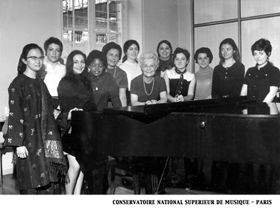Studies Abroad
In October of 1967, Flavia began studying music seriously for the first time in Paris. She opted for the piano instead of the violin, and took private lessons with Pierre Sancan,
a piano professor of repute at the Conservatoire National Superieur de Musique, and a renowned composer of ‘Prix de Rome’ status. It took two years of hard work and long hours of practicing during which much had to be corrected and at times, even deconstructed from scratch, before Flavia attempted the difficult competitive entrance examinations (or Concours) to the Paris Conservatoire.
At the time of her studies at the Conservatoire, Monsieur B.G.Epinat
was the French Ambassador to Malaysia, and during her summer vacation back home in Kuala Lumpur in 1970, Flavia was invited to play to a select audience at the Ambassador’s residence.
Back in Paris she was introduced to
Madame Yvonne Loriod, the wife of noted French composer, Olivier Messiaen, who, in turn, introduced her to
Madame Germaine Mounier, a piano professor at the
Ecole Normale Superieure de Musique. Flavia started to prepare for the
Concours of the ‘Licence d’Enseignement’ (or Teaching Degree) which she obtained in June 1973 with the distinction of being “premiere nommee a l’unanimite avec les felicitations du jury” - unanimously nominated first with the congratulations of the jury.
In the summer of 1973, Flavia returned to Malaysia for six months during which she gave a concert at the Radio and Television House, Angkasapuri in Kuala Lumpur. A new auditorium had just been built and the Ministry of Information and Culture shared the sponsorship of the concert together with the French Embassy and the Alliance Francaise of Kuala Lumpur.
Back in Paris in February 1974, Flavia began intensive training for her final examinations, or Concours, for the prestigious ‘Licence de Concert
’ (Performing Degree) under the tutelage of Madame Germaine Mounier. In June of the same year she was awarded her third, and last, French Government scholarship because of her excellent results in obtaining the ‘Licence d’Enseignement’ (Teaching Degree) as well as the success of the Angkasapuri concert.
In the summer of
1975, Flavia was accepted to study with international pianist,
Stephen Bishop-Kovacevic, at his masterclasses which were held in Dartington in England. During these masterclasses, international concertiste, Martha Argerich, who was there together with Stephen Bishop-Kovacevic, gave Flavia her opinion and valuable reviews as an artist whenever Flavia played in the piano masterclasses.
On the left, Stephen Bishop together with Flavia and students: Enjoying the English sunshine during a break in classes











